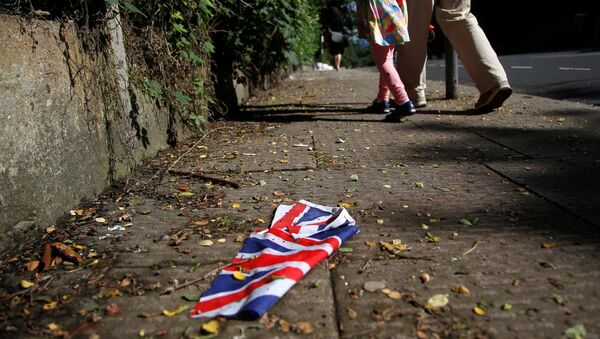The movement for a ‘People’s Vote’ on Brexit is gathering momentum. It’s been pushed by and large by those who never wanted the UK to leave the EU in the first place and who are trying to find a ‘democratic’ way to overturn the referendum result.
READ MORE: UK Home Secretary Javid Set to Unveil White Paper on Brexit Immigration Targets
In any case, holding a second poll, in which ‘Remain’ was an option before the first vote had been implemented would be fundamentally undemocratic, as the Green Party’s Caroline Lucas, who is now backing a ’People’s Vote’, herself admitted at a Post-Brexit conference in 2016.
‘To seek to over-rule the outcome of the referendum is bad politics and worse democracy’ she said. Lucas was right in 2016, but she’s not right today.
A far better solution would be to have a Second Referendum but only in 2029, ten years after the UK has officially left the EU.
The 52% who voted for Brexit would have their faith in the democratic process, which has taken a real battering of late, restored. But the 48% who voted to ‘Remain’ would have some hope that the decision could be reversed within a reasonable time period.
Ten years would be long enough to see if Brexit would be a success, but not too long to make Remainers despair. It would also give an incentive for the EU to reform and make membership more attractive. If Brussels proved to be a very vindictive divorce partner, then they’d only be decreasing the chances of a re-marriage.
Some Brexiteers might ask ’Why do Remainers only have to wait ten years for another go, while we had to wait 41 years after losing the 1975 referendum?‘ The answer to that is ‘take a look at the respective results’. In June 1975, 17.378,581 voted to stay in the then EEC, amounting to 67.23% of those who voted. 8,470.073 voted to Leave (32.77%) on a turn-out of 64%
In other words, ‘Remain’ in 1975 received more than twice the number of votes ‘Leave’ did. There was a majority of votes in all parts of the UK for ‘Remain‘.
In 2016 however it was much closer. The closeness of the result, and the fact that two constituent parts of Britain, Scotland and Northern Ireland, voted to Remain, means that another referendum, ten years down the line, is democratically justified.
Of course, a lot can change in a decade. Remainers might find that their worst fears about leaving the EU don’t come to pass and they end up enjoying life in Brexit Britain. By contrast, Brexiteers, who dreamt for years of the freedoms Britain would enjoy unshackled from Brussels, might be disappointed with the outcome. It could also be that the EU itself had disintegrated by 2029, meaning that there’d be nothing to rejoin.
No one really knows how Brexit will turn out. So why don‘t we give it a try for ten years and then take stock of the situation again? Parties in the House of Commons could agree to fix the date for a national referendum on whether Britain should rejoin or stay out of the EU (if it still exists) for Thursday 29th March 2029. The day after is ‘Good Friday’, but whether it will be ‘Good’ for Eurosceptics or Europhiles, would depend on what happens from 2019 onwards.
READ MORE: 'Enough is Enough': SNP, 3 Other Parties Table No-Confidence Motion in UK Govt
My proposal won’t gain the approval of the most die-hard Remainers who are appalled at the very idea of leaving the EU, even for 24 hours. Neither will it be supported by the most-hard-core of Brexiteers who regard the matter as totally settled for eternity. But I hope it does gain the approval of everyone else in between, who wants to see an end to the in-fighting, the smears and the increasingly bitter divisions and would like to see government focus on pressing problems like rising poverty, a soaring crime rate and under-investment in public services.
However you voted in 2016, I wish you a very Merry Christmas.
Follow Neil Clark @NeilClark66 and @MightyMagyar
Support his Anti-Stalker Crowdfund
The views and opinions expressed by the contributor do not necessarily reflect those of Sputnik.





